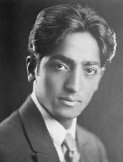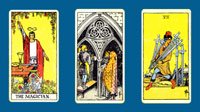Jiddu Krishnamurti
 |
Profile
Birthdate: May 12, 1895 - February 17, 1986 Jiddo Krishnamurti began his career, in his teens, when C.W. Leadbeater spotted him on the grounds of the Theosophical Society Headquarters in India. Leadbeater was attracted by his aura and suspected he was meant to be the "vehicle" for an expected World Teacher that was to come.
|
As a result, he was introduced to Annie Besant who took on his tutorship and care.
He later rejected this idea that he was this world teacher that the Theosophical Society was predicting but went on the become a philosopher, speaker, mystic and author traveling worldwide and influencing many with his teachings.
|
Books Action and Relationship - Jiddo Krishnamurti As One Is: To Free the Mind from All Conditioning - J. Krishnamurti |
Amazon Synopsis: This title contains a series of 8 lectures, given in Ojai, California in 1955, from one of the 20th century's greatest philosophers and teachers. Krishnamurti confronts the typical grasping and confused mind which lies at the root of all violence and suffering. Though offered over fifty years ago, the ideas in these talks are fresh, relevant and offer an enduring message for today as Krishnamurti discusses a world in which booming productivity and scientific advancement should promise a happy future, but don't.
He points also to the ongoing escalation of war, competition, envy and territoriality despite gains in education, religious ecumenism and the technologies of self-improvement. He asks his listeners to consider that all apparent progress is simply another illusion. In their brilliantly clear essays, his focus is singular, with no glib answers to eternal questions. To read this book is to venture into the unexplored assumptions that govern our lives. The workings of the mind are so simple and obvious in J Krishnamurti's explanations, yet so enormously challenging to confront. Like other classic texts, such as religious scriptures, the words ring true.
The issues addressed include: the nature of violence; the problem of change; the conditioning of the mind; how to achieve "peace"; the nature of worship and spiritual practice; and how to really listen.
The Awakening of Intelligence - Jiddu Krishnamurti 1987
Amazon Synopsis This comprehensive record of Krishnamurti’s teachings is an excellent,
wide-ranging introduction to the great philosopher’s thought. With among
others, Jacob Needleman, Alain Naude, and Swami Venkatasananda, Krishnamurti
examines such issues as the role of the teacher and tradition; the need for
awareness of ‘cosmic consciousness; the problem of good and evil; and
traditional Vedanta methods of help for different levels of seekers.
Beyond Violence - J. Krishnamurti 1973
From Chapter One: I WOULD LIKE to talk about the whole problem of existence.
Probably you know as well as the speaker what is actually taking place in the world - utter chaos, disorder, violence, extreme forms of brutality, riots ending up in war. Our lives are extraordinarily difficult, confused and contradictory, not only in ourselves - inside the skin as it were - but also outwardly. There is utter destruction. All the values are changing from day to day, there is no respect, no authority, and nobody has faith in anything whatsoever; neither in the Church, nor in the establishment, nor in any philosophy. So one is left absolutely to oneself to find out what one is to do in this chaotic world. What is the right action? - if there is such a thing as right action.
The Book of Life: Daily Meditations with Krishnamurti - Jiddu Krishnamurti 1995
Amazon Synopsis: Krishnamurti is a leading spiritual teacher of our century. In The
First and Last Freedom he cuts away symbols and false associations in the
search for pure truth and perfect freedom. Through discussions on suffering,
fear, gossip, sex and other topics, Krishnamurti's quest becomes the readers,
an undertaking of tremendous significance.
Can Humanity Change?: J. Krishnamurti in Dialogue with Buddhists - Jiddu Krishnamurti 2003
Amazon Synopsis: Many have considered Buddhism to be the religion closest in spirit to J. Krishnamurti's spiritual teaching—even though the great teacher was famous for urging students to seek truth outside organized religion. This record of a historic encounter between Krishnamurti and a group of Buddhist scholars provides a unique opportunity to see what the great teacher had to say himself about Buddhist teachings. The conversations, which took place in London in the late 1970s, focused on human consciousness and its potential for transformation. Participants include Walpola Rahula, the renowned Sri Lankan Buddhist monk and scholar, author of the classic introductory text What the Buddha Taught.
Choiceless Awareness - Jiddu Krishnamurti 1992
Amazon Synopsis: Krishnamurti proposes that the current crisis is not social,
political, economic or religious but the direct consequence of our fragmented
way of living: The fault is in our consciousness. Over 600 passages were
studied in all, and the aspects of choiceless awareness most frequently
addressed by Krishnamurti were noted and then selectedfor this book.
|
Commentaries On Living Series 1 - J Krishnamurti Commentaries On Living Series 2 - J Krishnamurti Commentaries On Living Series 3 - J Krishnamurti |
Education and the Significance of Life - Krishnamurti 1981
Amazon Synopsis: The teacher probes the Western problems of conformity and loss of
personal values while offering a fresh approach to self-understanding and the
meaning of personal freedom and mature love.
Education as Service - J. Krishnamurti
From Foreword: Though many people may think the ideals put forward (in this book) are entirely beyond the average teacher, and cannot be put into practice in ordinary schools, I can thus point at least to one institution in which I have seen many of the suggestions made in this book actually carried out. It may be that some of them are, at present, beyond most schools; but they will be recognised and practised as soon as teachers realise them as desirable, and have a proper understanding of the importance of their office.
Most of the recommendations apply, I think, to all countries, and to all religions, and are intended to sound the note of our common brotherhood, irrespective of religion or caste, race or colour. If the unity of life and the oneness of its purpose could be clearly taught to the young in schools, how much brighter would be our hopes for the future! The mutual distrust of races and nations would disappear, if the children were trained in mutual love and sympathy as members of one great family of children all over the world, instead of being taught to glory only in their own traditions and to despise those of others. True patriotism is a beautiful quality in children, for it means unselfishness of purpose and enthusiasm for great ideals; but that is false patriotism which shows itself in contempt for other nations.
There are, I am told, many organisations within the various nations of the world, intended to inspire the children with a love for their country and a desire to serve her, and that is surely good; but I wonder when there will be an international organisation to give the children of all nations common ideals also, and a knowledge of the real foundation of right action, the Brotherhood of Man. Read online or download
Eight Conversations - J. Krishamurti
The Ending of Time (Dialogue) - J. Krishnamurti and David Bohm 1985
Amazon Synopsis: This very important work offers penetrating dialogues between the great spiritual leader and the renowned physicist that shed light on the fundamental nature of existence. Krishnamurti and David Bohm probe such questions as ‘why has humanity made thought so important in every aspect of life? How does one cleanse the mind of the ‘accumulation of time’ and break the ‘pattern of ego -centered activity’? The Ending of Time concludes by referring to the wrong turn humanity has taken, but does not see this as something from which there is no escape. There is an insistence that mankind can change fundamentally; but this requires going from one’s narrow and particular interests toward the general, and ultimately moving still deeper into that purity of compassion, love and intelligence that originates beyond thought, time, or even emptiness.
|
The First and Last Freedom - J. Krishnamurti & Aldous Huxley 1975 Amazon Synopsis: Krishnamurti is a leading spiritual teacher of our century. In The First and Last Freedom he cuts away symbols and false associations in the search for pure truth and perfect freedom. Through discussions on suffering, fear, gossip, sex and other topics, Krishnamurti’s quest becomes the readers, an undertaking of tremendous significance. |
Flame of Attention - J. Krishnamurti 1984
Publisher's Synopsis: Brings insight and compassion to bear on the
problems of insecurity and anxiety, and the solutions one finds through
"attentiveness''--the key to true intelligence.
Flight of the Eagle - J. Krishnamurti 2004
Amazon Synopsis: Regarded as one of the great spiritual teachers of the twentieth century, Krishnamurti delivered his radical insights with a disarming simplicity. Here, in records of talks and dialogues in London, Paris, Amsterdam and Saanen, Switzerland, he speaks on freedom, fragmentation, radical change and more.
Chapter titles include:
Freedom, Fragmentation, Meditation, Can Man Change?, Why Can’t We Live at
Peace?, The Wholeness of Life, Fear, The Transcendental, On Violence, On
Radical Change, The Art of Seeing, On Penetrating the Unknown.
Freedom from the Known - Jiddu Krishnamurti and Mary Lutyens 1975
Amazon Synopsis: Krishnamurti shows how people can free themselves radically and immediately from the tyranny of the expected, no matter what their age--opening the door to transforming society and their relationships.
The Future of Humanity - J. Krishnamurti with David Bohm
Inward Flowering - Jiddu Krishnamurti
J Krishnamurti - The Mirror of Relationship: Love, Sex, and Chastity - Jiddu Krishnamurti 2012
Amazon Synopsis: Krishnamurti stressed that relationship is the mirror in which we see ourselves as we are. Topics discussed include the nature of image-making, pleasure and desire, sex, chastity, marriage, and love--When sexual feeling is born out of pleasure it is lust. If it is born out of love it is not lust, even though great delight may then be present.
J Krishnamurti Relationships To Oneself, To Others, To the World - Jiddu Krishnamurti 2010
J Krishnamurti - Why do you live With Stress - Jiddu Krishnamurti 2012
Amazon Synopsis: In this incredibly penetrating talk, Krishnamurti describes the psychological pressures of life and how these pressures affect right living: 'We were saying that any form of pressure on the brain affects our whole way of life. We were also saying that this pressure affects our activities, our attitudes, our character, and our way of living. The pressure--economic, social, ethical, and religious--invariably distorts not only our actions but the quality of the brain ... ideals affect, oppress, and act as pressure upon our daily life.
Is it possible not to have any ideals but only deal with actually what is? --then there is no pressure whatsoever. Krishnamurti goes on to say that, unless the mind is free of pressure, there is no new way of living. He states that this insight on freedom requires a great deal of investigation into the whole nature and movement of pressure.
The Krishnamurti Reader - J. Krishnamurti 2011
Amazon Synopsis: J. Krishnamurti was renowned for the penetrating insight and immediacy of his spiritual teachings. Radical in his day for seeking truth beyond the boundaries of religion, ideology, or tradition, he declared that "Truth is a pathless land, and you cannot approach it by any path whatsoever." He traveled and lectured throughout the world, calling for a new approach to life and spirituality.
In this compilation of Krishnamurti's most essential teachings, he explores what he calls "the art of living." The topics addressed include such perennial human concerns as: living life without conflict and confusion, how to act with skill and clarity, the significance of meditation, death and dying, true freedom, and bringing the sacred into everyday life. These timeless teachings guide us to live our lives simply, intelligently, and with great love—free from the bonds of sorrow and fear.
Krishnamurti: Reflections on the Self - Jiddu Krishnamurti and Raymond Martin 1998
Amazon Synopsis: Described by the Dalai Lama as "one of the greatest thinkers of the age", Jiddu Krishnamurti has influenced millions throughout the 20th century, including Aldous Huxley, Bertrand Russell, Henry Miller and Joseph Campbell. Born of middle-class Brahmin parents in 1895, Krishnamurti was recognised at age fourteen by theosophists Annie Besant and C W Leadbetter as an anticipated world teacher and proclaimed to be the vehicle for the reincarnation of Christ in the West and of Buddha in the East.
In 1929 he repudiated these claims and travelled the world, sharing his philosophical insights and establishing schools and foundations. Because Krishnamurti had no interest in presenting theories, his thought is far removed from academic philosophy in the analytic tradition, yet his insights remain extremely relevant to contemporary philosophical theories and to those interested in understanding themselves and the world. Rather than a theorist, Krishnamurti is regarded as a seer and a teacher. He perceived inherent distorting psychological structures that bring about a division in the individual's consciousness between "the observer" and "the observed". He believed this division was a potent source of conflict, both within the individual and externally for society as a whole, and offered a way to transcend these harmful structures through a radical transformation in human consciousness.
This is a collection of Krishnamurti's writings and lectures about the individual in relation to society. He examines the importance of inquiry, the role of the emotions, the relation between experience and the self, the observer/observed distinction, the nature of freedom, and other philosophical ideas.
Krishnamurti's Journal - J. Krishnamurti 1982
Krishnamurti's Notebook - Jiddu Krishnamurti 2004
Amazon Synopsis: When Krishnamurti's Notebook first became available in 1976, it was soon realized that it was a spiritually unique document giving his perceptions and experiences and describing his states of consciousness. It is a kind of diary but one that is little concerned with the day to day process of living, though very much aware of the natural world.
Krishnamurti to Himself: His Last Journal - Jiddu Krishnamurti 1993
Amazon Synopsis: Krishnamurti's last journal, spoken into a tape recorder at his home, Pine Cottage, in the Ojai Valley, brings the reader close to this renowned spiritual teacher. Dictated in the mornings, from his bed, undisturbed, Krishnamurti's observations are captured here in all their immediacy and candor, from personal reflections to poetic musings on nature and a serene meditation on death.
Reflecting the culmination of a life of spiritual exploration, these remarkable final teachings engage and enlighten.
Life Ahead: On Learning and the Search for Meaning - J. Krishnamurti 2005
|
On Fear - Jiddu Krishnamurti 1994 Amazon Synopsis:This is a collection of the counsellor and teacher, J. Krishnamurti's most profound observations and thoughts on how fear and dependence affect our lives and prevent us from seeing our true selves. Among the many questions Krishnamurti addresses in these teachings are: how can a mind that is afraid love?; and what can a mind that depends on attachment know of joy? |
He points out that the voice of ear makes the mind dull and insensitive, and argues that the roots of hidden fears, which limit us and from which we constantly seek escape, cannot be discovered through analysis of the past. Questioning whether the exercise of will can eliminate the debilitating effects of fear, he suggests, instead, that only a fundamental realization of the root of all fear can free our minds.
On Love and Loneliness - Jiddu Krishnamurti 1994
Amazon Synopsis: In 1950 Krishnamurti said: "It is only when the mind is not escaping in any form that it is possible to be in direct communion with that thing we call loneliness, the alone, and to have communion with that thing, there must be affection, there must be love."
On Love and Loneliness is a compelling investigation of our intimate relationships with ourselves, others, and society. Krishnamurti suggests that "true relationship" can come into being only when there is self-knowledge of the conditions which divide and isolate individuals and groups. Only by renouncing the self can we understand the problem of loneliness, and truly love.
The Revolution from Within [With DVD] - J. Krishnamurti
Amazon Synopsis: This title includes a book & DVD. 'There must be a revolution in our thinking', declares the author, J Krishnamurti (1895-1986), who remains one of the greatest philosophers and teachers of modern times. In this series of lectures, given in the U.S. and various cities throughout the world in the 1950s, he again confronts the habitual, projection-making mind, which fails to see what is while it absorbs itself in belief and illusion.
Topics covered in these essays include: the process of change at all levels; the development of discipline; quieting the mind; self-awareness; and, freedom from slavery to mind. While we humans are constantly making superficial modifications of our circumstances, such gestures never lead to a radical transformation characterised by clarity, lack of prejudice, spontaneity, genuine peace and happiness.
People would rather line up behind some leader, or a particular religious teaching, following the dictates of some outside authority, than to think for themselves, Krishnamurti explains. Sadly, 'most of our existence is spent in that way - trying to live up to something, trying to bring about a change in our attitude, to change according to the pattern which we have projected as an ideal, as a belief'. Only by rigorous self observation and self questioning is there any hope that humankind will overcome its blindness and self-obsession enough to bring about an end of violence, war and other misery on this beleaguered planet.
Talks and Dialogues - J. Krishnamurti 1986
Think on These Things - Jiddu Krishnamurti 1989
Amazon Synopsis: The material contained in this volume was originally presented in the form of talks to students, teachers and parents in India, but its keen penetration and lucid simplicity will be deeply meaningful to thoughtful people everywhere, of all ages, and in every walk of life. Krishnamurti examines with characteristic objectivity and insight the expressions of what we are pleased to call our culture, our education, religion, politics and tradition; and he throws much light on such basic emotions as ambition, greed and envy, the desire for security and the lust for power – all of which he shows to be deteriorating factors in human society.
This Light in Oneself: True Meditation - J. Krishnamurti 2011
Amazon Synopsis: These selections present the core of Krishnamurti's teaching on meditation, taken from discussions with small groups, as well as from public talks to large audiences. His main theme is the essential need to look inward, to know ourselves, in order really to understand our own—and the world's—conflicts. We are the world, says Krishnamurti, and it is our individual chaos that creates social disorder. He offers timeless insights into the source of true freedom and wisdom.
To Be Human - Jiddu Krishnamurti 2000
Amazon Synopsis: To Be Human presents Krishnamurti's radical vision of life in a new way. At the heart of this extraordinary collection are passages from the great teacher's talks that amplify and clarify the nature of truth and those obstacles that often prevent us from seeing it. Most of these core teachings have not been available in print until now.
Besides presenting the core of Krishnamurti's message, the book alerts the reader to his innovative use of language, the ways in which he would use "old words with new interpretations," then gives practical examples, showing that we can clarify our understanding of life itself—and act on this new understanding.
|
The splendid introduction by David Skitt discusses Krishnamurti's philosophy as a guide to knowledge and experience, the roles knowledge and experience should play in our lives, and the times when it is best to cast them aside and "look and act anew." The book's source notes will aid the inquisitive reader who wishes a deeper understanding of this great teacher's message. |
Total Freedom: The Essential Krishnamurti - Jiddu Krishnamurti 1996
Amazon Synopsis: Counted among his admirers are Jonas Salk, Aldous Huxley, David Hockney, and Van Morrison, along with countless other philosophers, artist, writers and students of the spiritual path. Now the trustees of Krishnamurti’s work have gathered his very best and most illuminating writings and talks to present in one volume the truly essential ideas of this great spiritual thinker.
Total Freedom includes selections from Krishnamurti’s early works, his ‘Commentaries on Living’, and his discourses on life, the self, meditation, sex and love. These writings reveal Krishnamuri’s core teachings in their full eloquence and power: the nature of personal freedom; the mysteries of life and death; and the ‘pathless land’, the personal search for truth and peace. Warning readers away from blind obedience to creeds or teachers – including himself – Krishnamurti celebrated the individual quest for truth, and thus became on of the most influential guides for independent-minded seekers of the twentieth century – and beyond.
Books about Krishamurti
Fire in the Mind Dialogues with J. Krishnamurti - Pupul Jayakar 1995
J. Krishnamurti: A Biography by Pupul Jayakar 2003
Amazon Synopsis: This is the biography of J. Krishnamurti, one of the great spiritual leaders of the 20th century. When he was just 14 in 1909, Krishnamurti was proclaimed the world teacher-to-be in which Maitreya, the Bodhisattva of compassion, would manifest. This proclamation was made by Annie Besant, the then president of the Theosophical Society, a movement that combined Western occult philosophy with Buddhist and Hindu teachings. But, despite undergoing 20 years of training, Krishnamurti rejected the Messianic role and set out alone on his spiritual quest. As a contemporary of Krishnamurti, the author, Pupul Jayakar, offers an insider's view of his life. She discusses Krishnamurti's thoughts and ideas on the mind, on meditation, on awareness and on religion, placing them in a historical context.
Krishnamurti: The Years of Awakening - Mary Lutyens 1997
Amazon Synopsis: In 1909, a boy of fourteen years was designated the savior of our age by the mystic leader of the Theosophical Society. Sent from his native India to study at the finest school in Britain, the charismatic youth was groomed for the messianic role of World Teacher—a mantle he would ultimately cast off, unleashing a storm of controversy within the spiritual community. And through inner doubts and physical agony—through bitter trials of the mind, the body, and the soul—he would follow his own path to enlightenment and become a shining beacon of joy and truth to millions the world over.
Living Without Fear - Dialogue with J. Krishnamurti - Paddy McMahon 2011
Amazon Synopsis: Since he came to know about him, Paddy McMahon (Patrick Francis) has been an admirer of Jiddhu Krishnamurti, the famous philosopher who lived on earth from 1895 to 1986, but never expected to have the privilege of communicating with him from another dimension of existence. This book is a record of those communications, which are presented as a dialogue between the spirit and human dimensions.
As the title suggests, one of the main objects of the book is to help people to free themselves from fear and, in the process, to open doors to themselves, to let them see that nothing is hidden and that there is no cache of secret knowledge to which they are not entitled to have access.
Do you like our website?
Please tell your friends about us.
Check out
Get a Religious Verse

Get a Spiritual Quote
Get a Free Tarot Reading

The Number One way to prevent Truth decay is to use mental floss daily.
-Swami Beyondananda
Peace I leave with you, my peace I give unto you: Not as the world giveth, give I unto you. Let not your heart be troubled, neither let it be afraid.
- John 14: 27, King James Bible
Some images on this site are Free Images from Dreamstime.com
Inch by inch, row by row, gonna make my garden grow. All it takes is a rake and a hoe, and a piece of fertile ground…
- John Denver, singer, songwriter
Well, the world’s not run by mothers. You know if it was, we’d all be taken care of.
- Faye Sanderson, my-spiritual-place.com

Donate to the Site and receive a free Angel Card Reading



